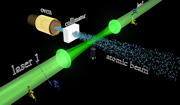


With a confidence level of one hundred billion to one, the most sensitive test yet of one of the pillars of modern physics—the spin-statistics theorem that explains why fermions are different from bosons—shows that the theorem really holds up.
The best theory for explaining the subatomic world got its start in 1928 when theorist Paul Dirac combined quantum mechanics with special relativity to explain the behavior of the electron. The result was relativistic quantum mechanics, which became a major ingredient in quantum field theory. With a few assumptions and ad hoc adjustments, quantum field theory has proven powerful enough to form the basis of the Standard Model of particles and forces.
“Even so, it should be remembered that the Standard Model is not a final theory of all phenomena, and is therefore inherently incomplete,” says Dmitry Budker, a staff scientist in the Nuclear Science Division.
In the June 25 issue of Physical Review Letters, he and his colleagues report the most rigorous trials yet of a fundamental assumption about how particles behave on the atomic scale. More
 Ever wonder what parallel programming is and how it can advance science? John Shalf, the team lead of the Advanced Technologies Group at the National Energy Research Scientific Computing Center, discusses the scientific need for parallel programming and its future in a Q&A conducted by International Science Grid This Week. Among many topics covered, Shalf explains the difference between parallel programming languages and programming languages, as well as emerging trends in computing. More
Ever wonder what parallel programming is and how it can advance science? John Shalf, the team lead of the Advanced Technologies Group at the National Energy Research Scientific Computing Center, discusses the scientific need for parallel programming and its future in a Q&A conducted by International Science Grid This Week. Among many topics covered, Shalf explains the difference between parallel programming languages and programming languages, as well as emerging trends in computing. More
 The first match of Berkeley Lab’s Carbon Smackdown summer lecture series takes place this Wednesday at noon in the Building 50 auditorium. Ashok Gadgil, Kayje Booker, and Adam Rausch will discuss how their work on efficient cookstoves for the developing world—from Darfur to Ethiopia and beyond—is reducing carbon dioxide emissions while also saving forests and improving health. Go here for the full summer line-up of matches pitting Berkeley Lab scientists against carbon dioxide.
The first match of Berkeley Lab’s Carbon Smackdown summer lecture series takes place this Wednesday at noon in the Building 50 auditorium. Ashok Gadgil, Kayje Booker, and Adam Rausch will discuss how their work on efficient cookstoves for the developing world—from Darfur to Ethiopia and beyond—is reducing carbon dioxide emissions while also saving forests and improving health. Go here for the full summer line-up of matches pitting Berkeley Lab scientists against carbon dioxide.
Employees have the right — and the responsibility — to identify and report improper governmental activities and environment, health and safety concerns without fear of reprisal. Employees are encouraged to discuss concerns with their supervisor or any level of management. If employees are unable to raise issues, or are uncomfortable doing so, alternative mechanisms are available for reporting, evaluating, and addressing concerns. In addition to the employee hotline number (800-403-4744), employees may report concerns via the web. Other available internal and external resources, including the State Auditor and DOE Office of the Inspector General, are listed on Lab and UC posters displayed throughout the Lab.
![]() On Wednesday and Friday, the IT Division will offer an introduction to Google Calendar for the casual user of Oracle Calendar. The introduction will help prepare staff for the migration to Google Calendar during the weekend of July 31. Both lectures will be held in the Bldg. 50 Auditorium from 9:30 to 10:30 a.m. The lectures will cover the basics: navigation, meeting management, adding and using secondary calendars, and viewing co-worker and resource calendars.
On Wednesday and Friday, the IT Division will offer an introduction to Google Calendar for the casual user of Oracle Calendar. The introduction will help prepare staff for the migration to Google Calendar during the weekend of July 31. Both lectures will be held in the Bldg. 50 Auditorium from 9:30 to 10:30 a.m. The lectures will cover the basics: navigation, meeting management, adding and using secondary calendars, and viewing co-worker and resource calendars.
 The Archives and Records Office offers a variety of services to help manage your Berkeley Lab records. Scientific and technical records are packed up and processed free of charge. Business records processing can be done for a fee. Employees may have a legal obligation to keep Berkeley Lab records, so don’t throw documents away without consulting the Archives and Records Office. Call us at x5525 for guidance.
The Archives and Records Office offers a variety of services to help manage your Berkeley Lab records. Scientific and technical records are packed up and processed free of charge. Business records processing can be done for a fee. Employees may have a legal obligation to keep Berkeley Lab records, so don’t throw documents away without consulting the Archives and Records Office. Call us at x5525 for guidance.
Beginning Thursday, the five-part shipping documents will be replaced by Point and Ship, the Lab's new online shipping system for all FedEx, UPS, and DHL shipments. Anyone shipping material from the Lab will need to go through Policy and Procedure training before access to Point and Ship will be granted. Training in Point and Ship will be offered Thursday at 10 a.m. in the Bldg. 50 Auditorium and 1:30 p.m. in the Bldg. 66 Auditorium. Contact [email protected] with questions.
An item in Friday’s Today at Berkeley Lab did not mention that Michael Wehner, a climate researcher in the Computational Research Division, is among the seven Berkeley Lab staff and two guests who have been selected to contribute to the Intergovernmental Panel on Climate Change’s fifth comprehensive report on climate change.
Today
at Berkeley Lab encourages feedback and story ideas
Deadline for submissions is 10 a.m. two days prior to publication
TABL is produced by Public Affairs' Communications Group